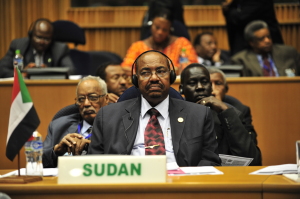Sudanese President of 25 Years to Seek Re-election
 Democracies have a myriad of essential characteristics. Among these are public elections, open access to information, decent probability that the incumbent party could get voted out, smooth transition in leadership, and the ability of elected officials to actually serve out their times in office. Traditionally speaking, in democratic political systems like that in the United States, incumbents are more than twice as likely to win an election.”
Democracies have a myriad of essential characteristics. Among these are public elections, open access to information, decent probability that the incumbent party could get voted out, smooth transition in leadership, and the ability of elected officials to actually serve out their times in office. Traditionally speaking, in democratic political systems like that in the United States, incumbents are more than twice as likely to win an election.”
Thus, it is easy to imagine the advantage that president Omar Hassan al-Bashir now possesses in his reelection campaign after 25 years in office. Given the nature of his largely autocratic style of governance, and the amount of assets, resources and connections that he has amassed in office, his announcement to run for reelection can practically be seen as his own inauguration for a sixth term in office, rendering these elections and really, any other attempt at a democratic process, a façade. Given that the average Sudanese citizen has a good idea of what the outcome of these elections will be, should the international community and the Sudanese people in particular be outraged by the prospect of another term with al-Bashir?
Three years ago, in a New York Times article published on February 21, 2011, President Bashir put out a statement through spokesman Rabie Abdel Attie, that he would not seek out reelection at the end of his fifth term. According to Mr. Abdel Attie, the president believed that "the chance should be given to the next generation" and that “he will work to establish a real democratic system in the country,” perhaps realizing that the system of governance that he had led was largely undemocratic. Although it caught many by surprise, members of opposing parties in Sudan in no way saw this as an opportunity to celebrate,” but (correctly) as a political move instead. Contextually, it is important to understand that when this message was put out in 2011, President Bashir was under serious investigation by the International Criminal Court for charges of genocide and other crimes against humanity. The country was also in the midst of huge protests and rebellions, leading students like 22-year-old Mouysar Hassan to see this statement as nothing more than “an attempt to anesthetize the streets.”
Today, as his presidential term comes to an end, it is interesting to see the new set of reasons for which President Bashir and his confidants feel that his reelection would be the most beneficial outcome for the country. For example, Minister of Culture and Information Ahmed Bilal Osman believes that “his [Bashir’s] reelection next year would make all parties feel at ease to participate in the national debate that Bashir has promoted,” especially since Sudan is now in a place where national dialogue is crucial towards solving the nation’s divisive issues. Bilal believes that given his experience and connections, all will feel satisfied in this unifying effort and they will all "be on one note." However, politicians like Mariam al-Sadig al-Mahdi, the first female vice president of the opposition Uma Party are unconvinced. She believes that in a repressive regime, everyone, including President Bashir himself, understand that this is once again just another political move to justify President Bashir’s decision to run for reelection. Additionally, in the midst of a potential arrest by the International Criminal Court, some believe that Bashir’s reelection campaign could also be an attempt to maintain his freedom.
In the wake of this election, one issue that has become particularly salient once again is the vastly undemocratic regime that Bashir has implemented in his time in office. Given the low possibility that Bashir will lose, parties like the Popular Congress Party have already chosen to not participate in the 2015 elections simply because they believe that the elections will not be fair. Yet, regardless of whether or not this will be the case, Bashir and his party bring up a good point: that Bashir has been in office for over two decades, and that having experienced the division and strife that his country has endured, he is perhaps the most knowledgeable, most experienced, and most connected person to lead peace talks, stability, and progress in the Sudan. However, when it comes to modes of governance, especially in a hybrid regime like Sudan’s, some questions remain: Is there such a thing as too much political experience? And, will stability in leadership truly lead to progress for a nation with age-old struggles?
